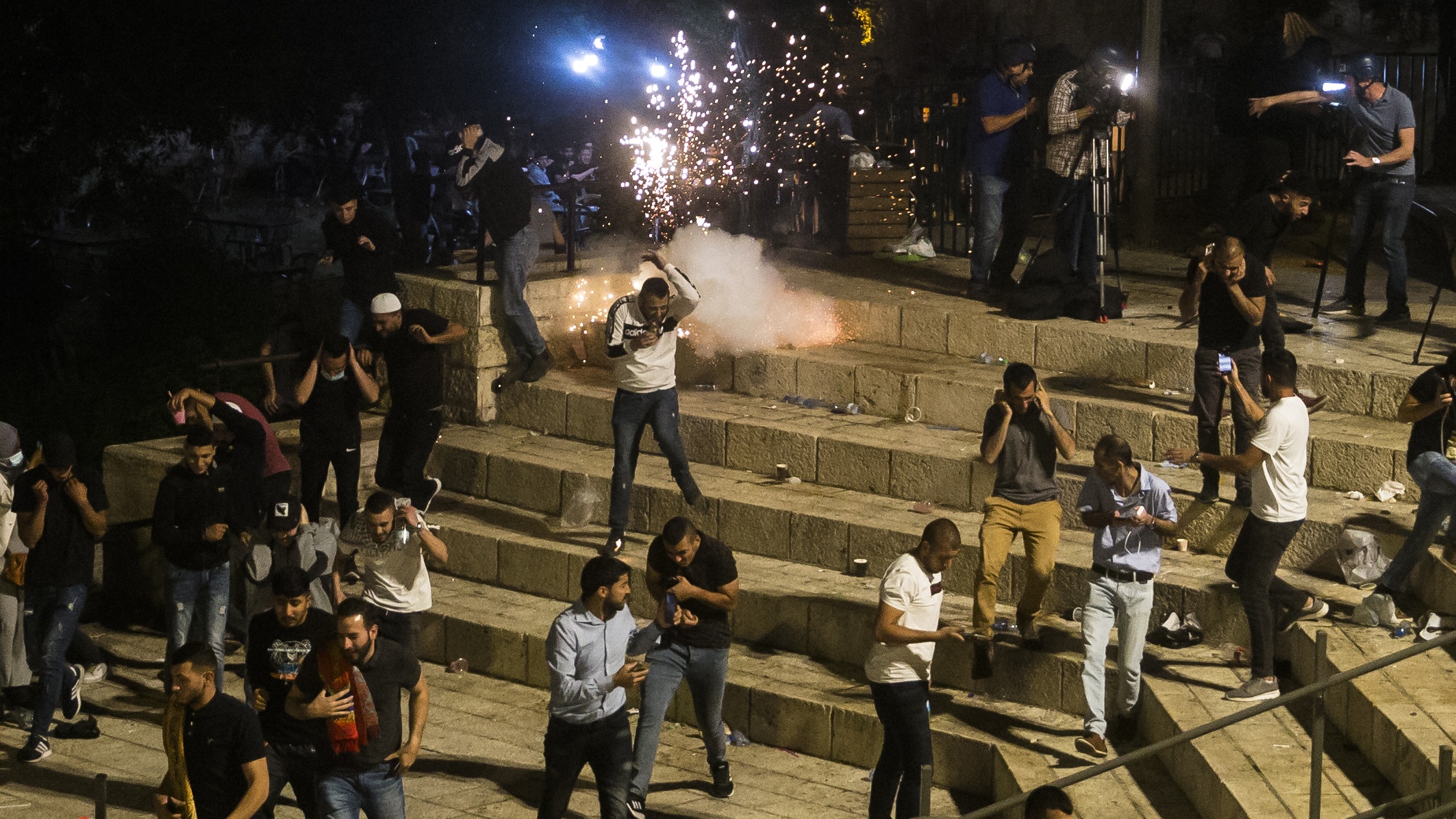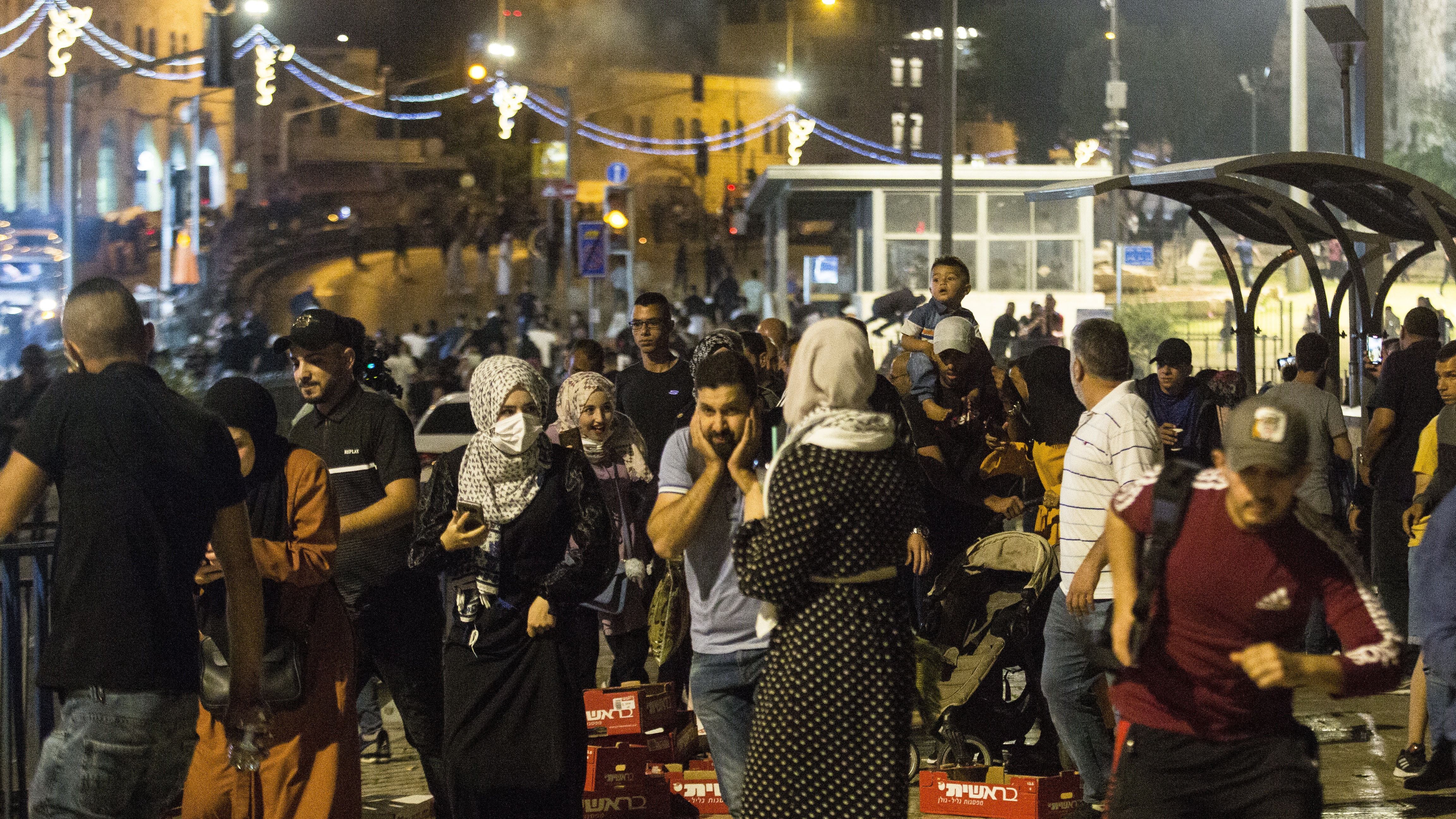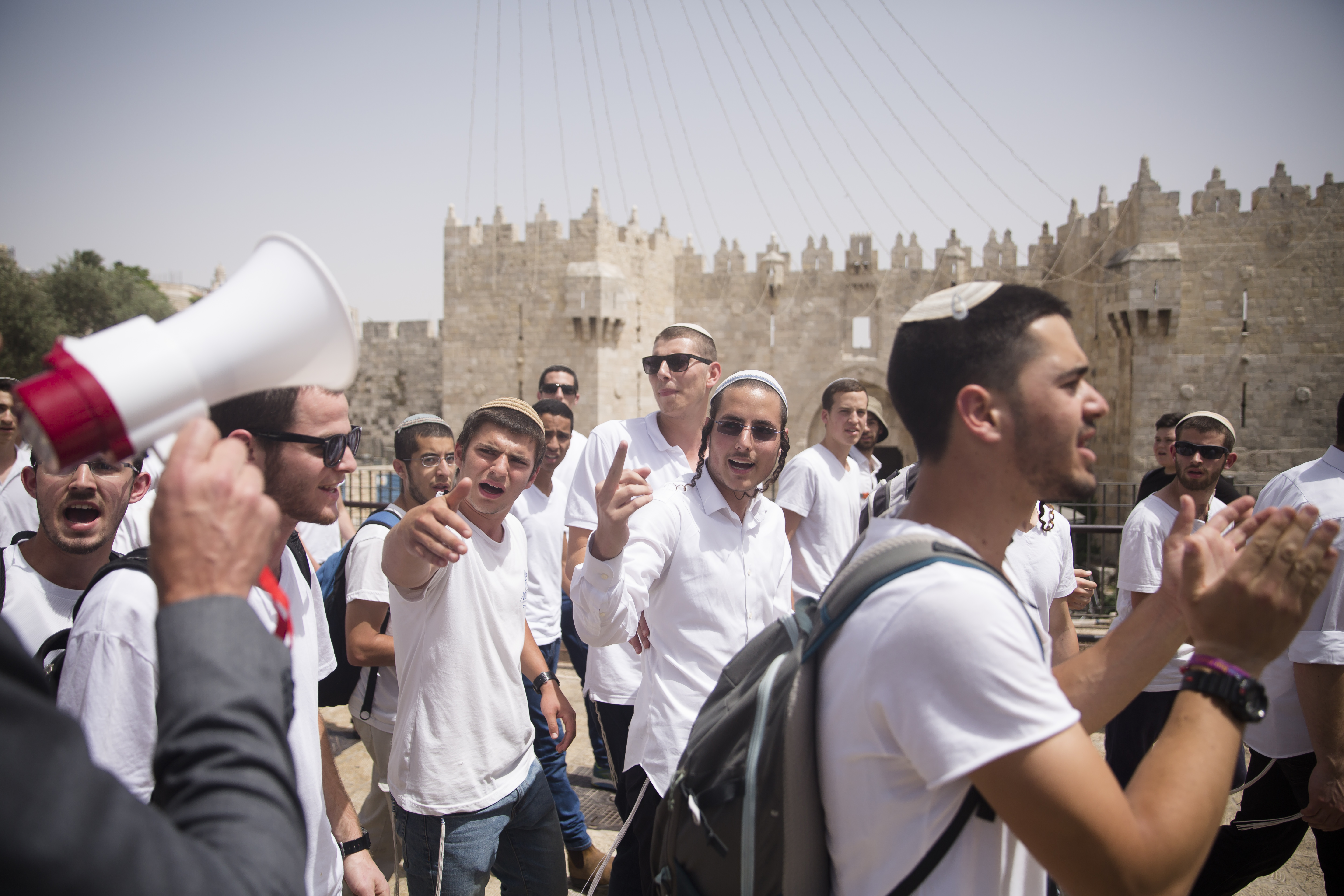What next as violence between Israel and Palestine spirals?
Gaza bombarded by military jets following Hamas rocket attacks on Jerusalem

A free daily email with the biggest news stories of the day – and the best features from TheWeek.com
You are now subscribed
Your newsletter sign-up was successful
More than 20 people including nine children have been killed by Israeli air strikes launched just hours after Benjamin Netanyahu warned that Palestinian militants would pay a “heavy price” for attacks on Jerusalem.
Israeli jets “bombarded” the Palestinian territory of Gaza last night after Hamas fired around 150 rockets towards Jerusalem, The Times reports. No Israeli casualties were reported in the attacks by the Palestinian Islamists, which came “after last-minute attempts to defuse growing protests and violence in East Jerusalem failed”, the paper adds.
In a statement released yesterday, Hamas said that its Al Qassam Brigades military wing was striking back against Jerusalem “in retaliation to its crimes and aggression on the holy city and brutality against our people in Sheikh Jarrah and Al Aqsa mosque”.
The Week
Escape your echo chamber. Get the facts behind the news, plus analysis from multiple perspectives.

Sign up for The Week's Free Newsletters
From our morning news briefing to a weekly Good News Newsletter, get the best of The Week delivered directly to your inbox.
From our morning news briefing to a weekly Good News Newsletter, get the best of The Week delivered directly to your inbox.
“This is a message to the enemy that it should understand it. If it returns, we will return. If it increases its aggression, we will increase our strikes,” Hamas added.
A city torn in two
The latest outbreak of violence in Jerusalem was triggered by a threat to evict six Arab families from a contested neighbourhood in the city’s Sheikh Jarrah district. Tensions have been stoked further by celebrations on Monday to mark Jerusalem Day, an annual event during which pro-settler groups typically stage “a provocative march through Arab areas”, The New York Times (NYT) reports.
The UN’s human rights office has urged Israel to halt any forced evictions, saying in a statement that “East Jerusalem remains part of the occupied Palestinian territory, in which international humanitarian law applies” and that “the occupying power must respect and cannot confiscate private property in occupied territory”.
A free daily email with the biggest news stories of the day – and the best features from TheWeek.com
Pleas for peace appear to be falling on deaf ears, however. On Friday, “more than 200 Palestinians and at least 17 Israeli police were wounded in skirmishes” near Jerusalem’s al-Aqsa mosque, the BBC reports.
Worshippers had been praying at the mosque, the third holiest site in Islam, to mark Laylat al-Qadr, the most holy night in the Muslim month of Ramadan. But chaos erupted when “riot police stormed the compound” firing “stun grenades, tear gas and sponge-coated bullets, some into the mosque itself”, The Times reports.
Videos posted online appear to show some stun grenades landing inside prayer rooms.

Hamas subsequently issued a 6pm deadline for Israeli security forces to withdraw from the mosque. The passing of that deadline saw the militants fire rockets at Jerusalem for the first time in seven years.
The Israeli military then responded with air strikes on Gaza, including one that “appeared to target a senior Hamas military commander”, the Financial Times (FT) reports.
And more air strikes are expected after Israeli Defence Forces spokesperson Jonathan Conricus said the military had a “green light” to hit military targets until Hamas “gets the message and learns its lesson”.
Arab-Israeli relations
Israeli Prime Minister Netayahu yesterday pinned the blame for the escalating violence on Hamas, saying that the group had crossed a “red line” with its rocket attacks and that the ongoing fighting could “continue for some time”.
Israel “shall not allow any radical element to undermine the calm”, he warned, adding: “We will not tolerate an attack on our territory, in our capital, on our citizens and soldiers. Whoever attacks us will pay a heavy price.”
On the other side of the battle lines, the office of Palestinian Authority (PA) President Mahmoud Abbas called the “brutal attacks” on al-Aqsa mosque “a new challenge to the international community”.
Meanwhile, the US has weighed in to defend the Israeli air strikes in Gaza. Appearing at a press conference, US State Department spokesperson Ned Price said that the Hamas fire “was clearly targeting innocent civilians in Israel”, adding: “The broader principle of self-defence is something that we stand by on behalf of Israel and every other country.”

The Arab world has lined up to condemn Israeli aggression, however, with the Iranian Foreign Ministry saying in a statement that “this war crime once again proved to the world the criminal nature of the illegitimate Zionist regime”.
The United Arab Emirates (UAE) - which last year normalised relations with Israel in a US-brokered deal - also “strongly condemned” the clashes and the potential Sheikh Jarrah evictions, in a statement by Minister of State for Foreign Affairs Khalifa al-Marar.
The UAE called on the Israeli authorities “to assume their responsibilities - in line with international law - to provide necessary protection to Palestinian civilians’ right to practice their religion, and to prevent practices that violate the sanctity of the Holy al-Aqsa mosque”.
Echoing that message, Turkish presidential spokesman Ibrahim Kalin tweeted: “Shame on Israel and those who keep silent in the face of disgraceful attacks on Masjid al-Aqsa in this holy month of fasting. Palestine and the Palestinians are not alone.”
What next?
Israel’s military has announced that further action will follow “in the coming days”, The Telegraph reports, and has “vowed to hold Hamas to account for attacks on civilians in Israel”.
Meanwhile, Hamas and Palestinian officials last night met with Turkish President Recep Tayyip Erdogan, whose office has said he will “do everything in his power to mobilise the world, starting with the Islamic world, to stop Israel’s terror and occupation”.
The atmosphere in Jerusalem’s Old City remains “tense”, the paper continues, with “hundreds of armed police officers deployed both outside and inside its walls”, and shopkeepers “ordered by police to close up their stalls”.
As further violence looms, Israeli leader Netanyahu is also battling for his personal political survival, with critics accusing the PM “of failing to focus on the situation as he attempts to hold on to office after a series of inconclusive elections”, The Times says.
After a fourth parliamentary election in two years once again delivered political deadlock in March, Israel’s longest-serving leader is facing an uncertain future after missing the deadline to form a coalition government last week.
With chaos all around, the Supreme Court yesterday delayed a hearing to decide on the fate of the six Palestinian families in the Sheikh Jarrah district - a case that remains a “rallying cry for Palestinians” who see the eviction effort as “ethnic cleansing and illegal”, the NYT reports.
Right-wing Israeli Jews have also taken up the case, saying that they are “fighting for their property as landowners while also attempting to ensure Jewish control over East Jerusalem”, the paper continues.
But with no end to the hostilities on the horizon, the eventual court decision in the Sheikh Jarrah dispute risks “a major flare-up in the Israeli-Palestinian conflict” that could gain “world attention after a period in which the Palestinian cause had been largely marginalised”.
-
 The problem with diagnosing profound autism
The problem with diagnosing profound autismThe Explainer Experts are reconsidering the idea of autism as a spectrum, which could impact diagnoses and policy making for the condition
-
 What to know before filing your own taxes for the first time
What to know before filing your own taxes for the first timethe explainer Tackle this financial milestone with confidence
-
 The biggest box office flops of the 21st century
The biggest box office flops of the 21st centuryin depth Unnecessary remakes and turgid, expensive CGI-fests highlight this list of these most notorious box-office losers
-
 Epstein files topple law CEO, roil UK government
Epstein files topple law CEO, roil UK governmentSpeed Read Peter Mandelson, Britain’s former ambassador to the US, is caught up in the scandal
-
 Iran and US prepare to meet after skirmishes
Iran and US prepare to meet after skirmishesSpeed Read The incident comes amid heightened tensions in the Middle East
-
 Israel retrieves final hostage’s body from Gaza
Israel retrieves final hostage’s body from GazaSpeed Read The 24-year-old police officer was killed during the initial Hamas attack
-
 China’s Xi targets top general in growing purge
China’s Xi targets top general in growing purgeSpeed Read Zhang Youxia is being investigated over ‘grave violations’ of the law
-
 Panama and Canada are negotiating over a crucial copper mine
Panama and Canada are negotiating over a crucial copper mineIn the Spotlight Panama is set to make a final decision on the mine this summer
-
 Why Greenland’s natural resources are nearly impossible to mine
Why Greenland’s natural resources are nearly impossible to mineThe Explainer The country’s natural landscape makes the task extremely difficult
-
 Iran cuts internet as protests escalate
Iran cuts internet as protests escalateSpeed Reada Government buildings across the country have been set on fire
-
 US nabs ‘shadow’ tanker claimed by Russia
US nabs ‘shadow’ tanker claimed by RussiaSpeed Read The ship was one of two vessels seized by the US military